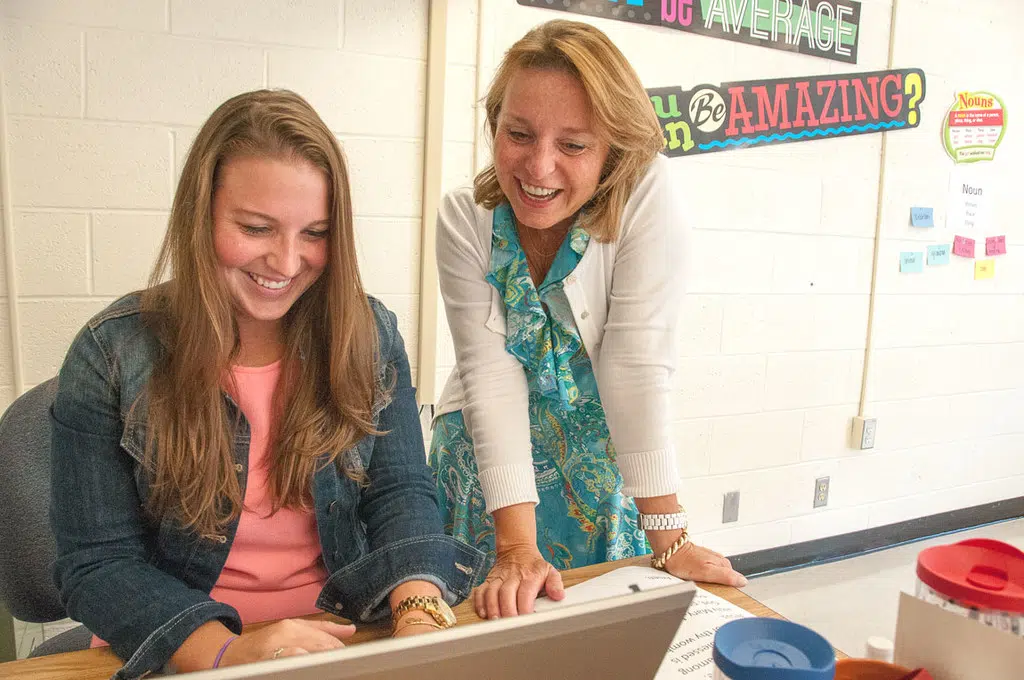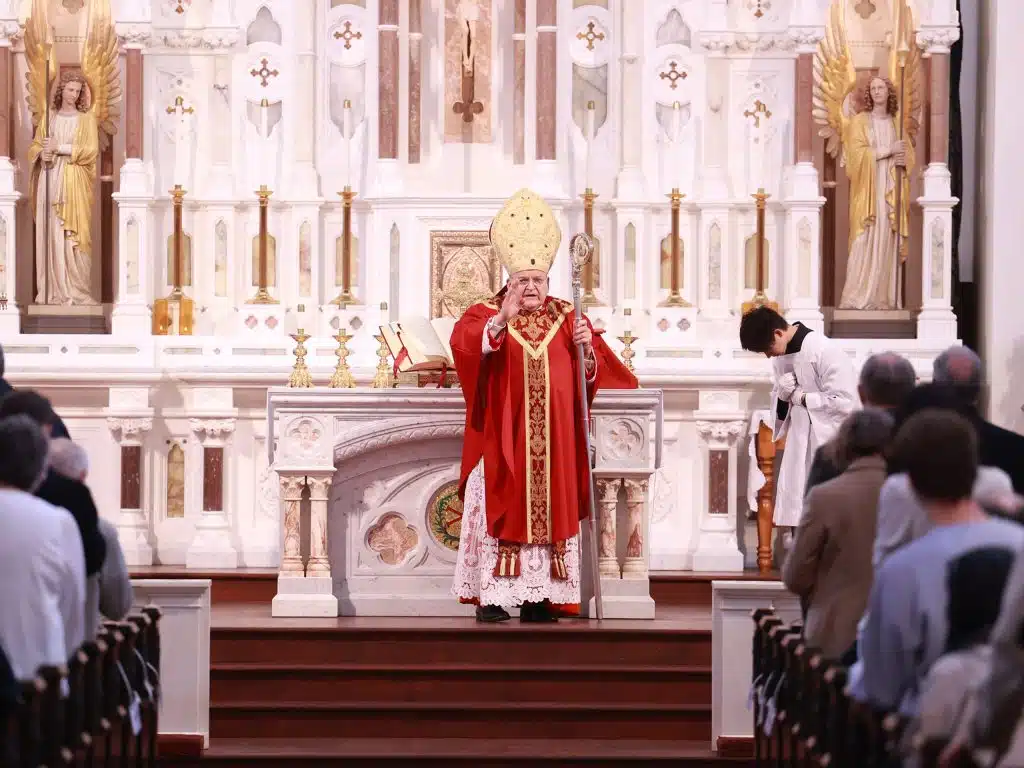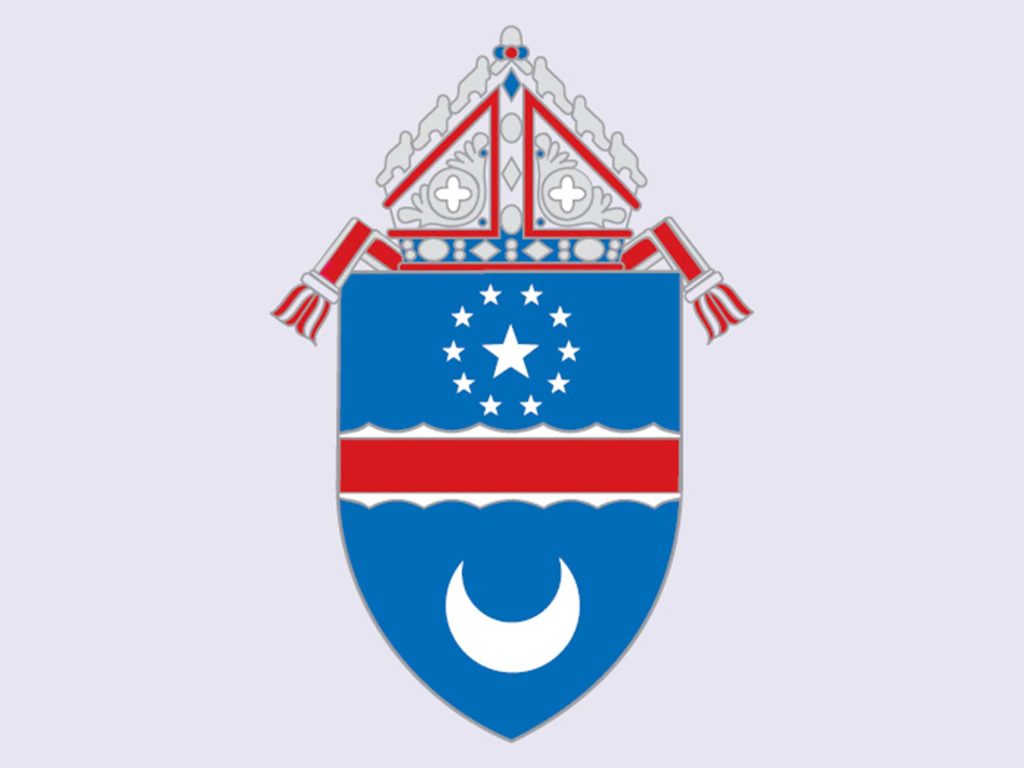They interrupt one another and finish each other’s sentences.
They laugh easily and cry every now and then. Chris and Mary
Desmarais have the unmistakable dynamic of a strong
mother-daughter relationship – one built on a common passion
for special education and, most importantly, their Catholic
faith.
“The faith my mom has shared is a huge gift,” said Mary,
sitting with her mom in a classroom at Bishop O’Connell High
School in Arlington, where she’s in her first year teaching
Expanded Services. Expanded Services is new to O’Connell and
integrates students with intellectual disabilities into the
school.
For more than a decade, Chris has worked at Paul VI Catholic
High School in Fairfax as director of Options, a
comprehensive special education program.
The duo’s parallel careers began with a person dear to them
both: Chris’ goddaughter and Mary’s cousin, Maddie, who has
Down syndrome.
“She has such a compassionate and spiritual nature,” said
Chris. “And she’s very genuine,” Mary added.
Maddie, now 25, is “so like me in many ways,” said Mary. “I
saw the similarities more than her differences, and I
connected on that level.”
It’s her spirit not Down syndrome that makes her unique, they
said, but she opened their eyes to an important population.
In the summer of 2003, Chris, who has a background in
psychology, felt it would be fulfilling “to work with a
population of individuals (whom) I thought I could serve
academically, but also learn from.”
So, with some urging from the Paul VI Options director, Chris
began taking graduate classes in special education. That fall
she started teaching in the Paul VI Options Program, now in
its 17th year. Chris was named director a year and a half
later, and she went on to earn her master’s in Catholic
school leadership and administration from Marymount
University in Arlington.
According to Chris, there’s a growing push in Catholic
schools to reach students with intellectual disabilities. As
part of that trend, O’Connell launched Expanded Services this
year, with Mary as its first teacher. Students receive
support in the classroom and individual or small-group
instruction when needed.
Mary insists her career choice did not emerge out of “a
desire to follow in my mom’s footsteps,” and her mother
agreed. Instead, it was a personal and circuitous path.
While a student at Paul VI, Mary was an Options peer mentor,
and she considered pursing special education in college. But
plans changed and she graduated from the University of
Scranton, a Jesuit school in Pennsylvania, with a degree in
marketing.
After a short stint in marketing, she realized she needed to
go with her gut and went back to school to earn her master’s
in special education.
“Sometimes you just know you’re supposed to do something, and
you just have to go with it,” she said.
Although she didn’t intend to replicate her mom’s career
path, Mary said her mother helped set her spiritual compass –
and that has informed all parts of her life.
Growing up, Mary recalls her mother squeezing in a prayer
wherever and whenever she could: before driving or eating,
when she washed her hands and when she heard an ambulance in
the distance.
“She’s got me on this big prayer kick,” said Mary. “She’s got
me praying more, and this summer I stated going to daily Mass
with her.”
Now Mary attends Mass whenever she gets the chance. “I
probably wouldn’t have done that without her influence,” she
said.
Mother and daughter studied in the halls of Catholic schools
for a total of 36 years, and teaching at O’Connell and Paul
VI allows them to share the formation they are so grateful
for.
Catholic schools are “in our genes,” said Chris.
“I love being in a place where you can talk about God, talk
about prayer,” Mary said. “It’s something I bring with me
every day into the classroom.”
Neither Mary nor Chris can talk about their job without
beaming.
“Working with people with intellectual disabilities, it’s not
just about the students; it’s a gift to the entire
community,” said Chris. “Everybody learns, everybody grows,
and everybody becomes a little more compassionate.”
Student mentors at both schools are a special part of their
work.
“Teens get a bad rap, but sometimes I call my mom and tell
her, ‘The peer mentors are just wonderful,'” said Mary. “I’m
not the emotional one, but oh my gosh, there are some good
souls here.”
With similar jobs, Chris and Mary regularly swap ideas and
resources. Mary’s sister, Annie, is a teacher at Paul VI, so
family gatherings regularly turn into lively discussions
about education.
“My poor father,” said Mary, laughing.
Looking over at her daughter, Chris said she’s proud of Mary
not because they have the same dedication to special
education, but because she’s fulfilling her vocation as a
teacher so beautifully.
“She made career choices that were hard to make and knew
there would be challenges and sacrifices ahead,” said Chris.
“I can hear the joy in her voice. I see her energy and
enthusiasm for what she’s doing. I think as a parent, you
can’t want a whole lot more for a son or daughter than that.”
To keep in mind
Mary and Chris Desmarais offered suggestions for interacting
with or speaking about people with intellectual disabilities:
Use people-first language, which emphasizes the
person, not the disability. For example, instead of saying,
“an autistic,” say, “a person with autism.”
“Our words and the meanings we attach to them create
attitudes, drive social policies and laws, influence our
feelings and decisions, and affect people’s daily lives,”
states The Arc, an advocacy group for individuals with
intellectual and developmental disabilities.
Don’t make assumptions. “People often make assumptions
about those with intellectual disabilities,” said Chris.
Don’t presume they don’t understand what you’re saying, can’t
hear you or don’t have the same desires or likes as you.
“They really are more like you than you think,” she said.
“Get to know them as individuals, just like you would get to
know anybody else,” added Mary.



